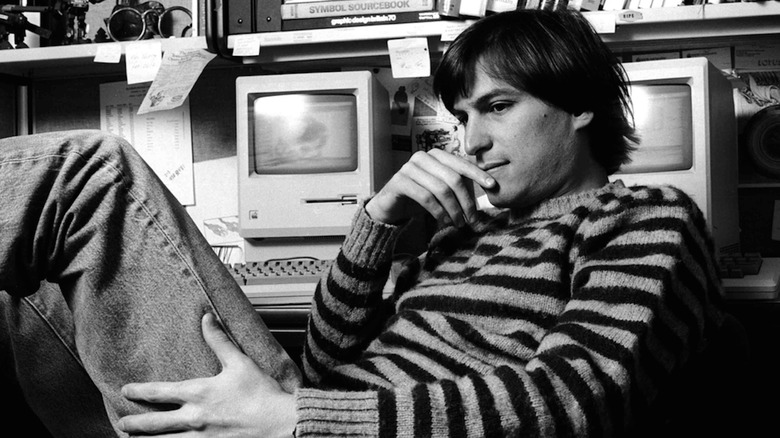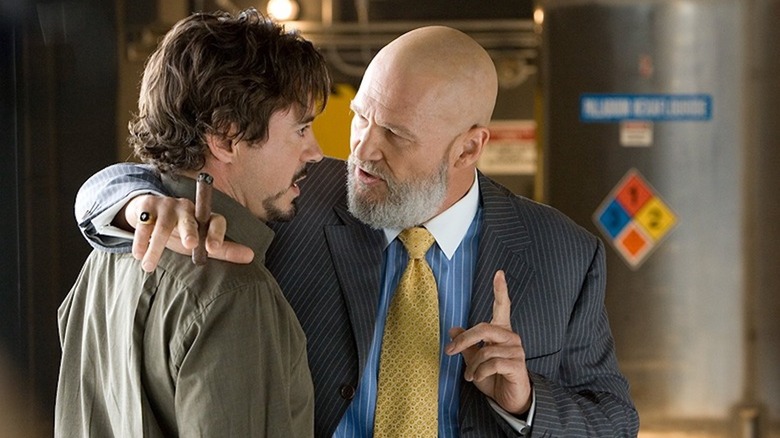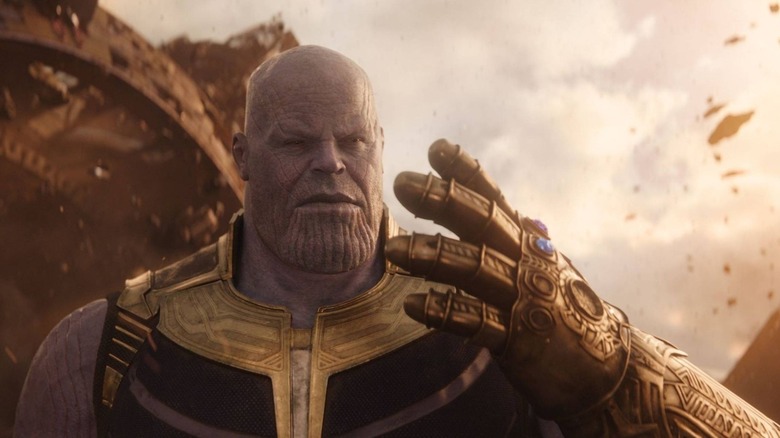How Steve Jobs Single-Handedly Sealed The Deal Between Marvel And Disney
Superhero movies had entered something of a transitional period in 2007. Sam Raimi's "Spider-Man" run had reached an unplanned end with the tepidly received "Spider-Man 3," leaving Sony facing the daunting prospect of rebooting a franchise that still had plenty of box office juice (the third installment racked up the webslinger's highest worldwide gross to date). Bryan Singer whiffed badly on the hugely expensive "Superman Returns," forcing Warner Bros. to pin its DC Comics hopes almost exclusively on Christopher Nolan's forthcoming sequel to "Batman Begins" (which was a modest commercial success). 20th Century Fox's "Fantastic Four" grossed just enough to merit a sequel, while the future of the "X-Men" franchise rested solely on the yoked shoulders of Hugh Jackman's Wolverine.
And then there was Marvel Studios, which, after watching their most popular characters make billions for other companies, yearned to control the narrative destinies of the characters they hadn't sold off. But everything changed in 2008.
Jon Favreau's "Iron Man" proved there was a massive audience for what many perceived as B-level characters. Nolan's "The Dark Knight," aside from grossing a jaw-dropping $1 billion, made superhero movies respectable in the eyes of critics and awards voters. Studios scrambled to develop as many comic book films as possible. Warner Bros., which owned DC, was suddenly on the brink of a commercial windfall. As for Marvel Studios, they'd become the town's most attractive free agent overnight, but not everyone saw the long-term potential of an Avengers saga. Disney's Bob Iger, however, did, and he moved to buy the company from then CEO Ike Perlmutter. You obviously know he succeeded, but are you aware that Apple honcho Steve Jobs helped to seal the deal?
The stakehouse seduction of Ike Perlmutter
According to "MCU: The Reign of Marvel Studios" by Joanna Robinson, Dave Gonzales and Gavin Edwards, Iger was patient in his wooing of Perlmutter. The hard-nosed Israeli-American considered Iger's overtures, but he was initially reluctant to go through with the sale. It wasn't until Iger cagily invited Perlmutter and his wife to the prestigious (and now erstwhile) Manhattan eatery the Post House for a no-business-talk dinner that Perlmutter began to show signs of doing the deal.
David Maisel, then one of Marvel Entertainment's top executives, began negotiating the terms of a sale with Disney's Executive Vice President Kevin A. Mayer and COO/CFO Thomas O. Staggs. Knowing precisely which details Mayer and Staggs would red flag, Maisal addressed these issues with Iger directly. On the cusp of entering formal negotiations, Maisal told Iger:
"We don't have the rights for Spider-Man. We don't have the rights for X-Men and Fantastic Four. We don't have theme parks east of the Mississippi, so you can't use the Marvel characters in your biggest theme park in Orlando. We have four movies left on our Paramount distribution deal, so you can't get your hands into those movies unless you buy them out."
Maisal then answered each caveat:
"If we had the rights to Spider-Man, the price would be a billion dollars more. And it'd be higher if we had X-Men. And all the characters we have, we have a universe that doesn't require those. Theme parks east of the Mississippi, yeah, but you have them everywhere else."
The deal seemed totally doable, but Perlmutter was still resistant. So Iger turned to Disney's largest individual shareholder for assistance.
How Jobs got Perlmutter to think different
Jobs acquired his majority shares in 2006 when he renegotiated Pixar's deal with Disney. Though he'd had a rocky relationship with the company's former CEO, Michael Eisner, Jobs respected Iger and was willing to vouch for his leadership style. "Is this one important to you?" he asked Iger. "Do you really want it? Is this another Pixar?" Iger said it was, so Jobs, who'd once said he'd "never read a comic book in his life," phoned Perlmutter and assured him that Disney would be as hands-off creatively as they'd been with Pixar.
At long last, Perlmutter was convinced. The deal closed in December 2009 for $4 billion, with Perlmutter personally pocketing $800 million in cash and $590 million in Disney stock (which made him the company's second-largest shareholder behind Jobs). For a solid decade, it was a hugely profitable marriage (though Perlmutter ceased to oversee Marvel Studios in 2015, after his racially insensitive comments about replacing Terence Howard with Don Cheadle in "Iron Man 2" went public, and was outright fired earlier this year after fomenting a failed shareholder coup).
Now, however, Marvel and comic book movies in general are once again at crossroads. Can the company get back on track creatively after the commercial disappointment of "Ant-Man and the Wasp: Quantumania" and the stunning disaster of "The Marvels?" This is one of the most intriguing questions being asked in Hollywood today, and no one has any idea how this will eventually play out.


